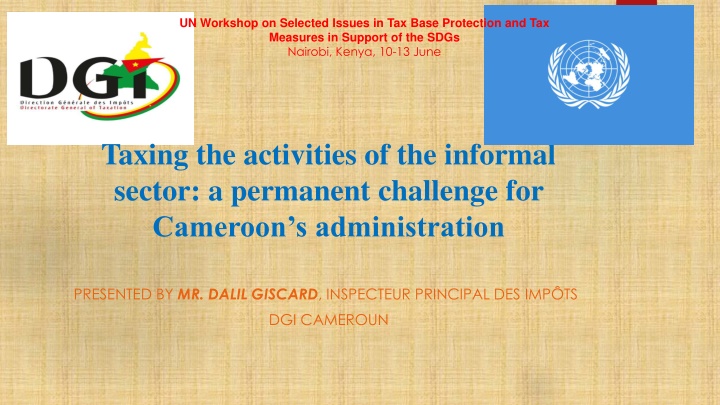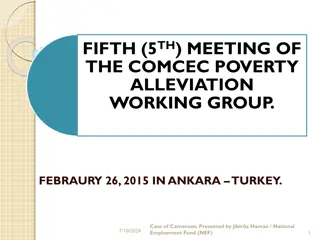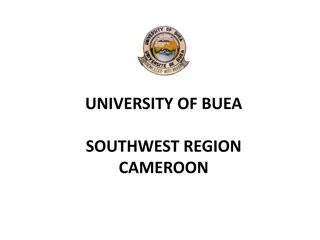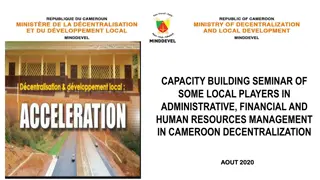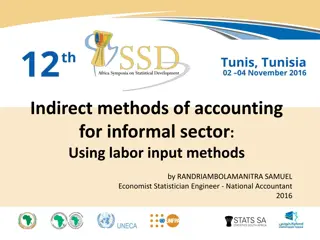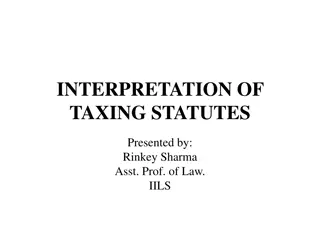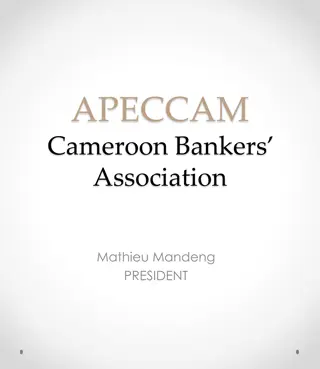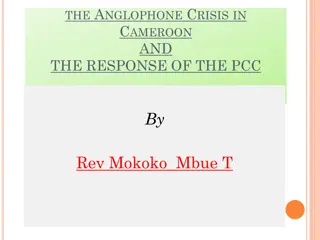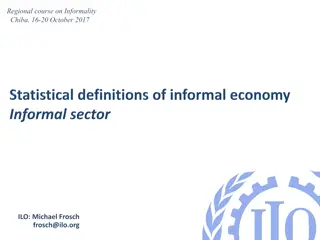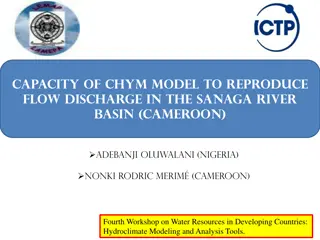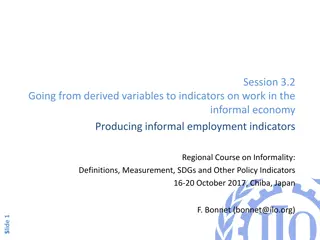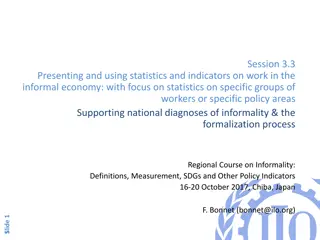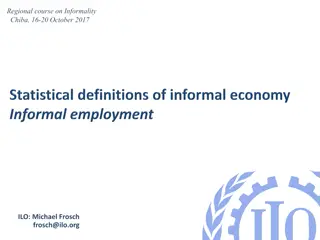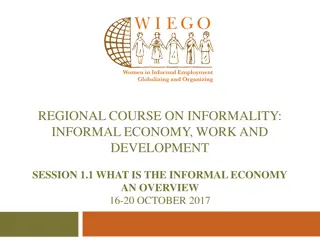Taxing the Informal Sector in Cameroon: Challenges and Strategies
Exploring the challenges faced by Cameroon's administration in formalizing and taxing the informal sector, along with strategies to enhance revenue collection. The presentation discusses recent successes, limitations, and perspectives on the formalization process, emphasizing the need for a specific taxation regime to effectively capture revenues from this significant sector of the economy.
Download Presentation

Please find below an Image/Link to download the presentation.
The content on the website is provided AS IS for your information and personal use only. It may not be sold, licensed, or shared on other websites without obtaining consent from the author.If you encounter any issues during the download, it is possible that the publisher has removed the file from their server.
You are allowed to download the files provided on this website for personal or commercial use, subject to the condition that they are used lawfully. All files are the property of their respective owners.
The content on the website is provided AS IS for your information and personal use only. It may not be sold, licensed, or shared on other websites without obtaining consent from the author.
E N D
Presentation Transcript
UN Workshop on Selected Issues in Tax Base Protection and Tax Measures in Support of the SDGs Nairobi, Kenya, 10-13 June Taxing the activities of the informal sector: a permanent challenge for Cameroon s administration PRESENTED BY MR. DALIL GISCARD, INSPECTEUR PRINCIPAL DES IMP TS DGI CAMEROUN
Structure of the presentation Recent successes of the work to formalise the informal sector Strategies to limit the sources of tax avoidance 2 The instruments to capture revenues linked to menial jobs Contemporaneous revenue taxation and monitoring of the underground economy Strategies to attract and retain informal sector companies Setting up simplified and attractive fiscal regimes for the smaller, less organised taxpayers Measures to facilitate the creation of new companies et accompany new taxpayers At the administrative level: a better organisation of the services Difficulties encountered and perspectives on the formalisation of the informal sector Limitations of the current system of taxation of the informal sector Perspectives on the formalisation of the informal sector and the capture of fiscal resources At the fiscal level: reinforcement of the measures correcting the current system Necessary structural reforms of traceability of financial and economic operations
Context and justification of a specific taxation of the informal sector in Cameroun 3 The informal sector represents a preponderant part of the economy and employment But the fiscal revenues generated by that sector are very limited Hence the necessity to reflect upon it, and plan reforms: economic equilibrium of that unstable sector to better tax this volatile and heterogeneous sector without endangering the fragile socio- a specific taxation regime focused on the environment of those activities is thus necessary The challenges of that work are perilous : equilibrium, while enabling their growth and progressive formalization fiscally capturing revenues and flows of informal activity without endangering the fragile What mechanisms have been set up by Cameroun to efficiently succeed in taxing the informal sector ? What are their limitations, and what are the options that will potentially substantially improve the efficiency of the different attempts to tax the informal sector ?
I. Recent successes of the work on the formalisation of the informal sector The informal sector regroups organisations receiving revenues or gains 4 which are not registered with the fiscal administration. Under-taxed activities due to the absence of accounting documents and clear modern rules of corporate management. 2 types of strategies have been set up, with an appropriate reorganization of the fiscal administration: Reduction of the sources of tax avoidance ; Strategies to attract and retain informal sector companies
I. Recent successes of the work on the formalisation of the informal sector 1) Strategies to limit the sources of tax avoidance The instruments to capture revenues from menial jobs of the underground economy Search for non-taxed economic activity and efficient evaluation of the evaluation method: taxation based on external signs of wealth; lump-sum evaluation of the inventories, right to enquire and visit, observation of the inventories. Contemporaneous revenue taxation and monitoring of the underground economy Withholding taxes for structured companies and non-deductibility of certain costs linked to transactions with informal sector entities: Non-deductibility of VAT and Corporate Taxes (IS) on cash transactions, payment of bills without NIU, of costs relating to the remuneration of liberal personnel operating outside of the rules and regulations Punishing the actors working with the entities of the informal sector: high deduction rate for IL and absence of NIU, importation ban for entities not registered with the fiscal services, impossibility to do move money between companies or to a bank without a debt clearance certificate and certification of absence from the files of the General Tax Directorate; etc. -Contemporaneous payment of the taxes (down payments and deductions), which are higher for non-compliant entities to ensure that the payments are not evaded 5
I. Recent successes of the work on the formalisation of the informal sector (cont.) 6 Strategies to attract and retain informal sector companies 2) Setting up simplified and attractive fiscal regimes for the smaller, less organised taxpayers Liberatory Tax (IL) for micro-companies, characterised by being subsistence activities (Revenues estimated inferior to 10M FCFA, or 182,000 USD) Tax regime adapted to micro-companies in order to limit the negative effects of the multiplicity and complexity of the taxes, which burden the small entrepreneurs who have often received little instruction. Unique tax, which frees the taxpayer from the revenue tax, the VAT and the patent. Payment mechanism simplified to the extreme: exemption from having to hold an accounting book; payments spread out throughout the year, global evaluation based on production factors (presence of a workshop, number of machines, etc.). The simplified tax regime will help small taxpayers transition towards the formal sector Revenues between 10 and 50 M FCFA (approximately 182,000-275,00USD) Minimal accountancy obligations, revenue tax regime, monthly fiscal declarations
I. Recent successes of the work on the formalisation of the informal sector (cont.) 2) Strategies to attract and retain informal sector companies Measures to facilitate the creation of new companies et accompany new taxpayers Creation of Centres for the Formalities of Enterprise Creation (CFCE) : eases the creation of companies, limited administrative fiscal burden, creation in 72h and experiments with online d clarations Setting up and support of the Government-Approved Management Centres (CGA) : assistance in terms of management, supervision and execution of fiscal and accounting duties of the taxpayers Fiscal facilitation for Small and Medium Companies (PME) Investments (PME Bank, APME, incentivisation regimes ; etc) 3) At the administrative level: a better organization of the services A new strategy of segmenting the taxpayers data bank and reorganizing the different departments for a better monitoring Specialisation of the CDI in the smaller taxpayers, and CIME in the medium-sized ones Strengthening the structures of revenue collection and exploitation of data for a fiscal purpose, with the extension of the competencies of the BNE and the creation of the BRE ApplicationsAREN, FUSION (DGI-DGD) Simplification of the fiscal duty of the taxpayers to limit tax avoidance Online tax reporting and payment via Mobile Money even for the smallest taxpayers ; Development of bank transfers and payments at the bank counter; Rationalisation of in-house interventions (single interventions) 7
II. Difficulties encountered and perspectives on the formalisation of the informal sector 8 Limitations of the current system of taxation of the informal sector 1) Structural limitations linked to the socio-political and economic environment The socio-cultural and political weights A familial workforce with only a limited level of education Mistrust of the State and the fiscal administration Insufficient public sector reforms: limited measures to support the formalisation of the economy, sparse and uncoordinated The limits of an unreliable economic environment Limited access to banking services and mistrust of the financial establishment vis- -vis informal sector agents Overrepresentation of volatile and unstructured activities, not adapted to classical financing and the formal economic sphere
II. Difficulties encountered and perspectives on the formalisation of the informal sector (cont.) 1) Limitations of the current system of taxation of the informal sector 9 Structural limitations linked to the socio-political and economic environment Limitations of the informal sector taxation system : Badly calibrated taxation r gimes ? Badly calibrated attraction framework ? Innefficiency of the tools deployed to monitor and manage the informal sector ? Limited computerization of the management tools Innapropriated matriculation limited to the fiscal services : inneficiency of the matriculation system (lack of liability, absence of a unique identifier extended to all the administrations such as Social Security, CNI, banks, Treasury, etc.) Absence of interconnexion with other computer tools used by the DGI and other financial administrations
II. Difficulties encountered and perspectives on the formalisation of the informal sector (cont.) 10 Perspectives on the formalisation of the informal sector and the capture of fiscal resources Necessary structural reforms of traceability of financial and economic operations Global strategies supporting access to banking and monetisation of the economy in order to support a broader financial inclusion (EMF, Mobile Money, etc.) Necessary structural reforms of the economy in order to integrate informal actors, aiming at a better structuration Support of the Small and Medium Enterprises and of artisanal or subsistence activities in a inscribed within a process of progressive formalisation At the fiscal level: reinforcement of the measures correcting the current system Strengthening of the intelligence structure: inquiry functions (strengthening of the fiscal data collection and exploitation tools) Modernisation of the taxation of physical non-professional individuals and strengthening of the estate taxation, as well as the fiscal cadastre Unavoidable reform of the matriculation process: securing a central file of taxpayers and extension of the NIU to all the economic transactions in order to secure a better traceability and financial inclusion 2)
11 Je Je vous vous remercie remercie pour aimable aimable attention pour votre votre attention THANK YOU FOR PAYING ATTENTION
